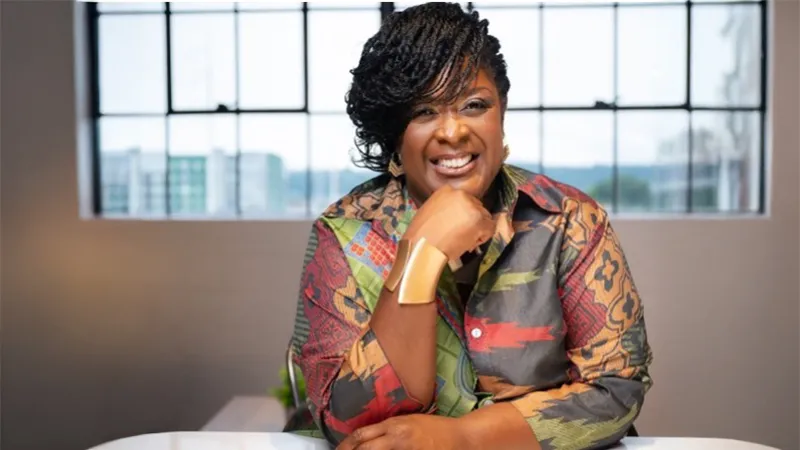Representation Matters: Advice From One Black Female Leader to Another


Margaret Thatcher once said: “If you want something said, ask a man; if you want something done, ask a woman.” Forbes recently extended this to Black women: “When Black women lead, we all win.” As a Black woman and current National Senior Executive Director of Program Design & Leadership Academy at New Leaders, I personally know that representation in leadership matters. Being in education for 20 years as a former teacher, coach, professional development facilitator, curriculum specialist, and program director, seeing myself reflected in the leaders around me has made all the difference in my leadership success.
I vividly remember teaching at a school in desperate need of reform. In four years, we experienced two principals and an interim. The school conditions were horrible. On any given day, 10-15 teachers would be absent, and we couldn’t get substitutes. Around 7:30 am, I’d hear our secretary say over the intercom, “Ms. Lewis…,” and I knew what would follow. I’d say how many and who, and she’d rattle off a list of names so I could start figuring out how to disburse students amongst my colleagues and me. To get through the day, we combined classrooms with up to 40 students, wall to wall. Later, on our way to lunch, we would walk students down hallways where the stench from sewage coming up in the building would overwhelm us and sour our stomachs. I wanted better for our students but didn’t know how to get there.
This was my reality for about four years until one day, a phenomenal Black female principal showed up and completely transformed our school within a year and a half. We went from the school nobody wanted to attend to a school that people couldn’t wait to learn more about.
Her biggest responsibility was turning the school around by creating better conditions for both students and staff to thrive. In her initial days, she completed a thorough needs assessment. Based on her observations, she crafted a sound strategic plan with high-priority areas of focus to be addressed. One focus area that helped to restructure everything else was the establishment of an instructional leadership team. She selected four black women, one of whom was me, and one black man, to be her instructional leadership team because she recognized our influence with other staff members and believed that we could help shift mindsets. She charged us with developing our staff so that we could scale high-quality instructional practices across the school.
What I appreciated the most was how she worked with us. During our planning sessions, we all were able to thoughtfully contribute to the work, and we could see ourselves in the end product. When we facilitated professional development sessions, she co-facilitated with us and provided real-time coaching and feedback along the way. She pushed our thinking, made space for our most creative thoughts to flow, gave us seats at many tables, and allowed us to build our instructional and leadership muscles while also holding a steady high bar for performance that we all rose to under her care and direction. Because of our shared leadership and successful implementation of high-quality instructional practices, our team thrived, individually and collectively. Student and teacher performance increased too.
She fought for our students and made sure they got what they needed by nurturing us and equipping the staff with the skills needed for success as a whole. This, by no means, was an easy feat; but we persevered and stuck to it. As a result, we all won: leadership, staff, students, families, and the community!
Much like then, current research shows that students of color and teachers benefit from having Black women as principals. Yet, just under 11 percent of our country’s public school principals are Black, and Black women, in particular, make up 7 percent nationally. However, not only do students and teachers benefit from Black women in leadership but so do other Black women interested in leadership. When I look back over the trajectory of my career, I can honestly say, every door that opened for me was done by an African American woman. And as I stepped through each door, I was met by another Black woman who automatically took me under her wing to help me think through complex adaptive challenges and build my strategic leadership muscle. I want the same to be true for other Black women seeking leadership. Here is what I learned from my principal and other Black female leaders on my journey:
Unity and Collective Responsibility
Build synergy, unity, and collective responsibility because success comes when people believe that they are a part of a solution and something bigger than themselves (like equity and justice) and when they are collectively responsible for carrying out the solution. No one ever wants to be the person who didn’t do her part, so have a “we are all in it” attitude. It goes a long way.
Mutual Trust, Respect, and Credibility
Be a woman of your word. This helps to build trust, respect, and credibility. When people see that your words are followed by action—agreed-upon actions that have results—they will begin to trust and respect you. This is what unity and collective responsibility are built on; without them, it’s impossible to accomplish anything.
Coaching and Capacity Building
Look for diamonds in the rough, Black females who have the potential to be great leaders. Hold high expectations for them; build their capacity through coaching, praising the leadership moves that benefit all involved while also addressing in a manner that balances the “here’s what went wrong”, what that means as a Black female leader, and what can be done to make it better in the future without compromising who the leader is.
Be Real About Leading While Black/Woman
Be transparent and openly share leadership experiences, both successes and challenges related to being Black and female and the feelings associated with it. The experiences shared will shed light on what future Black female leaders may experience. Describe the leadership moves that contributed to successes and how the challenges were overcome to give them confidence that they, too, can do this thing called “leadership” while Black and a woman.
A Model of Authentic Success
Be yourself and demonstrate what effective leadership looks like as a Black female leader. There is no other person in the world like you. No other person who has the fight that you have on the inside of you. You will be planted in spaces that need every single piece of who you are. Lead authentically, with passion, because those Black female leaders in your informal pipeline to leadership are watching!
Over my career, I’ve seen how Black women are often called upon to lead major change efforts because we have what it takes to get the job done in a manner that is fair and just; and, we do so with high expectations, class, and grace, all in the face of our double disadvantage: being Black and women. Because of that double disadvantage, we often experience disbelief from our colleagues that we: 1) are incapable of handling major charges within a leadership role; 2) have to jump through multiple hoops for the approval of tasks; and, 3) need to be questioned at every step.
People fail to realize that Black female leaders, despite those challenges, are highly intelligent and resilient like none other. That disbelief and resistance from others fuel our passion and drive within. While the challenges we face can be daunting, overwhelming, and mentally taxing, we lean on our circle of other Black female leaders for motivation, inspiration, encouragement, and thought partnership. And like my former principal and our dream team, our legacy stands.
So, being black and a woman truly is an asset instead of a disadvantage. We just have to help others see it. For this reason, representation of Black female leaders, especially in school leadership, really matters. Speaking as one who had a strong Black female leader and one who is a Black female leader, I wholeheartedly believe: “When Black women lead, we all win!”




.svg)
.svg)
.svg)
.svg)



.svg)
.svg)








